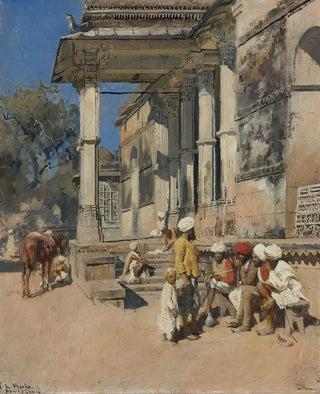Painting Portico of a mosque in Ahmedabad - Edwin Lord Weeks | Art print


View from behind

Frame (optional)
In the vibrant world of oriental art, "Portico of a Mosque in Ahmedabad" by Edwin Lord Weeks stands out for its ability to capture the essence of a moment and a place. This artwork, created at the end of the 19th century, transports us to the heart of India, where cultural and spiritual richness intertwines with majestic architecture. The portico, with its delicately carved arches and refined motifs, evokes not only the beauty of a religious building but also an atmosphere filled with mystery and serenity. Through this art print, viewers are invited to explore the nuances of a landscape where history and spirituality intertwine.
Style and uniqueness of the work
Edwin Lord Weeks' style is characterized by meticulous attention to detail and a palette of vibrant colors. In "Portico of a Mosque in Ahmedabad," he succeeds in transcribing the light of the Orient, playing with shadows and reflections to bring the scene to life. Geometric and floral motifs, typical of Islamic architecture, are depicted with such finesse that they seem almost tangible. The composition of the piece, with its harmonious balance between architectural elements and the surrounding landscape, creates a total immersion. Weeks does not merely reproduce a building; he captures an atmosphere, a mood that invites contemplation and meditation. It is this singularity that makes this artwork a true masterpiece, transcending the simple frame of a painting to become an aesthetic and spiritual experience.
The artist and his influence
Edwin Lord Weeks, an emblematic figure of Orientalism, made his mark through his travels and works inspired by India. Born in 1849 in Boston, he dedicated his life to exploring Eastern cultures, immersing himself in their traditions and art. His unique approach, blending realism and romanticism, influenced many artists of his time and continues to inspire future generations. Weeks established a dialogue between the West and the East, offering a nuanced and respectful vision of the civilizations he encountered. Through his works, he has

Matte finish

View from behind

Frame (optional)
In the vibrant world of oriental art, "Portico of a Mosque in Ahmedabad" by Edwin Lord Weeks stands out for its ability to capture the essence of a moment and a place. This artwork, created at the end of the 19th century, transports us to the heart of India, where cultural and spiritual richness intertwines with majestic architecture. The portico, with its delicately carved arches and refined motifs, evokes not only the beauty of a religious building but also an atmosphere filled with mystery and serenity. Through this art print, viewers are invited to explore the nuances of a landscape where history and spirituality intertwine.
Style and uniqueness of the work
Edwin Lord Weeks' style is characterized by meticulous attention to detail and a palette of vibrant colors. In "Portico of a Mosque in Ahmedabad," he succeeds in transcribing the light of the Orient, playing with shadows and reflections to bring the scene to life. Geometric and floral motifs, typical of Islamic architecture, are depicted with such finesse that they seem almost tangible. The composition of the piece, with its harmonious balance between architectural elements and the surrounding landscape, creates a total immersion. Weeks does not merely reproduce a building; he captures an atmosphere, a mood that invites contemplation and meditation. It is this singularity that makes this artwork a true masterpiece, transcending the simple frame of a painting to become an aesthetic and spiritual experience.
The artist and his influence
Edwin Lord Weeks, an emblematic figure of Orientalism, made his mark through his travels and works inspired by India. Born in 1849 in Boston, he dedicated his life to exploring Eastern cultures, immersing himself in their traditions and art. His unique approach, blending realism and romanticism, influenced many artists of his time and continues to inspire future generations. Weeks established a dialogue between the West and the East, offering a nuanced and respectful vision of the civilizations he encountered. Through his works, he has
12,34 €






